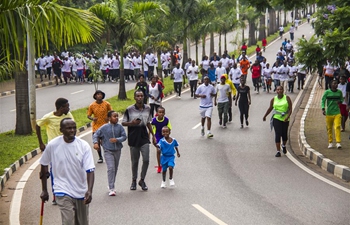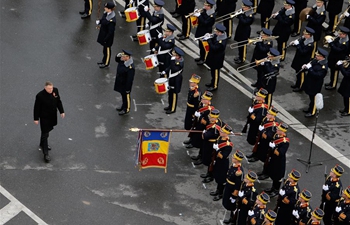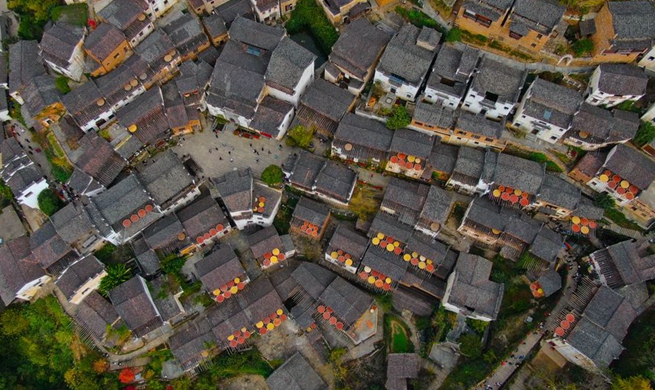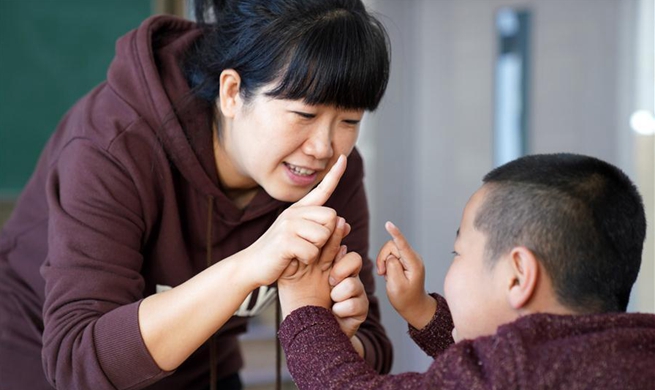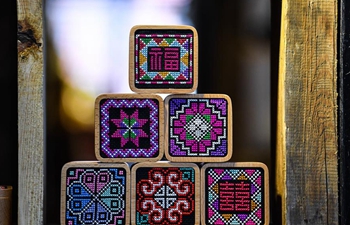NAKURU, Kenya, Dec.2 (Xinhua) --Kenyan artists are breaking the norm to sensitize communities on the need to eradicate gender-based violence (GBV), which is one of the worst forms of violation of the rights of women and girls.
Through the use of techniques such as theme-based songs and Theatre of the Oppressed, pioneered by late Brazilian thespian Augusto Boal and which seeks to promote social change, the artists aim at reversing worrying trends of GBV in Kenya.
How to end GBV in the country where statistics show 45 percent of women and 44 percent of men between 15-49 years having experienced some form of violence in their lifetime, is the focus of anti-GBV campaigners in the ongoing 16 days of activism.
The annual campaign started on Nov.25 and ends on Dec.10.
James Mwachia, a thespian based in Nakuru town, about 160 km northwest of the Kenyan capital Nairobi, has collaborated with six other colleagues to highlight the impacts of GBV on women and girls.
"As artists, we have a role to play in creating a society free from discrimination and violence," Mwachia told Xinhua on Sunday.
He also serves as Secretary to Secretariat of Creative Economy Structure in Nakuru County, and has always been appalled by the growing menace of violence against women and girls.
"I am always saddened when I read or watch news about a woman killed or beaten by a lame partner and when even men and boys are also falling victims...we live in these communities and we must bring change," said Mwachia.
His group uses Theatre of the Oppressed skills in staging performances at the communities' social facilities.
Unlike theatre plays where people sit and watch, their performances are curiosity-driven and participatory.
The technique intertwines the role of the oppressed, oppressor and the victim in sensitizing the people against GBV.
"Take an example of a man who has defiled a girl and the mother is attempting to seek justice but the perpetrator threatens the mother into dropping her pursuit," said Mwachia.
"In this case, the oppressed is the mother, the oppressor is the perpetrator and the girl is the victim. We help the community to look through this process of violence and dictate solutions which they vow to adhere to," he added.
Last year, he said a local community made a declaration biding the residents to mitigate violence against women, following the staging of their play at a school.
The theater group organizes plays into three parts. Each part takes a maximum of four minutes.
Later on, the artists stage each scene and engage the community in identifying the wrongs before suggesting solutions.
Then they allow community members to act the ideal situation informed by the floated resolutions.
"This technique (Theatre of the Oppressed) opens the mind of people. It makes them realize that they have a role to play in putting to an end to rape or defilement," said Mwachia.
They started the anti-GBV performances in 2017 and have staged more than 10 plays around Nakuru and other several counties in the coast region.
Tony Muguna, a Kenyan artist popularly known as Y-not Champe, is popularizing the use of arbitration in resolving wrangles in intimate relationships or marriages.
He is conducting awareness through his song Tatua (resolve), which calls on couples or intimate partners to find a harmonious way of solving the differences.
"Frequent killings and battering of women by their husband or boyfriends motivated me to compose the song," said Muguna adding that he finished composing the song mid this year after witnessing physical violence against women in Nairobi.
"I was disturbed by the events and wanted a change. I felt my song would touch many people and change their mindsets towards speaking against GBV," said Muguna
So far, he has performed at different events across the country and the latest was during the launch of the 16 days of activism on the outskirts of Nairobi where even refugees were in attendance.
A 2016 study by National Gender Equality Commission (NGEC) indicates that GBV survivors in Kenya bear a heavy economic burden in a country where households are struggling with financial difficulties as firms are shedding off the workforce due to dwindling returns on their investments.

